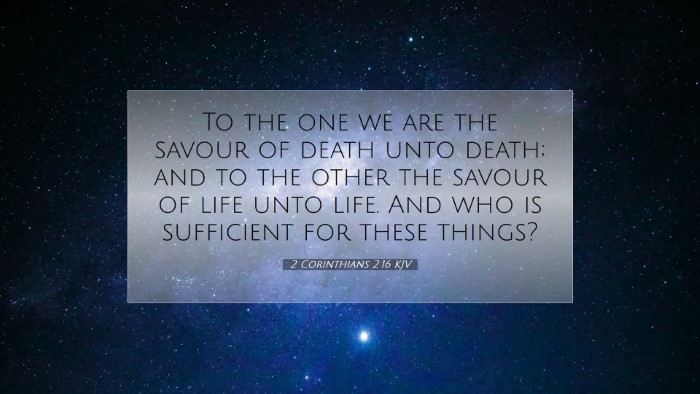Commentary on 2 Corinthians 2:16
Verse: "To the one we are the aroma of death unto death; and to the other the aroma of life unto life: and who is sufficient for these things?"
Introduction
The Apostle Paul's second letter to the Corinthians is rich in theological insight and practical application. In 2 Corinthians 2:16, Paul uses the metaphor of aroma to illustrate the dual responses to the gospel message. This commentary draws from the works of Matthew Henry, Albert Barnes, and Adam Clarke to explore the implications of this verse for believers and their mission.
Aroma as a Metaphor
The metaphor of aroma signifies the effect that the Gospel of Christ has on different people. Paul emphasizes that the same message evokes contrasting reactions, which highlights the divisive nature of the truth.
1. The Aroma of Death unto Death
Paul describes one group as receiving “the aroma of death unto death.” This reflects a profound reality: the message of the Gospel is a source of condemnation to those who reject it. Matthew Henry points out that for the unrepentant sinner, the preaching of the word serves only to remind them of their sins and impending judgment, thus leading them towards spiritual death.
- Condemnation: The “aroma of death” signifies their spiritual state and judgment. The more they hear, the more their guilt and the weight of sin become apparent.
- Hardness of Heart: Albert Barnes elaborates on this notion, asserting that continued rejection of the message hardens the heart, culminating in a state of spiritual death.
2. The Aroma of Life unto Life
Conversely, Paul states that for others, the same gospel is “the aroma of life unto life.” Here, the Gospel brings spiritual vitality and eternal life to those who embrace it. Adam Clarke emphasizes the transformative power of the Gospel; for those who accept it, it becomes a catalyst for spiritual growth and renewal.
- Salvation and Renewal: This experience represents not just a change in destination but a complete transformation of the believer’s life.
- Hope and Assurance: The aroma symbolizes the sweetness of hope and the assurance of eternal life found in Christ.
The Question of Sufficiency
The rhetorical question “And who is sufficient for these things?” speaks to the gravity of the task entrusted to the apostles. Both Henry and Barnes reflect on the weighty responsibility of preaching a message that can lead to eternal life or death.
- Humility: Paul expresses profound humility throughout this letter, recognizing that no one is adequate in themselves to undertake such a monumental commission.
- Dependence on God: Adam Clarke adds that the sufficiency comes not from human wisdom or ability but from the grace of God which empowers the minister to proclaim the life-giving gospel.
Application for Ministry
This passage serves as a reminder of the complexities involved in ministry and evangelism. Pastors and theologians must approach their work with a nuanced understanding of the diverse reactions to the Gospel.
- Awareness: Ministers must recognize that while they share the Gospel faithfully, it is God who ultimately determines the heart’s response.
- Expect Divergent Reactions: As Barnes advises, believers should not be discouraged by opposition, as the aroma of life will resonate with some while bringing conviction to others.
- Encourage Faithfulness: The duty of every believer is to remain faithful in presenting the Gospel, trusting in God’s ability to bring life through His message.
Conclusion
2 Corinthians 2:16 encapsulates the essence of the Christian mission: the proclamation of a message that brings both hope and condemnation. Understanding this duality is crucial for effective ministry. As we strive to be faithful heralds of the Gospel, we must rest in the sufficiency of God’s grace and remain committed to our call.


